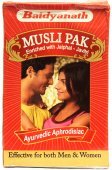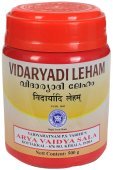Musali, Musalī, Mushali, Muśalī: 17 definitions
Introduction:
Musali means something in Hinduism, Sanskrit, Buddhism, Pali, Marathi, Jainism, Prakrit, Hindi, biology. If you want to know the exact meaning, history, etymology or English translation of this term then check out the descriptions on this page. Add your comment or reference to a book if you want to contribute to this summary article.
The Sanskrit term Muśalī can be transliterated into English as Musali or Mushali, using the IAST transliteration scheme (?).
Alternative spellings of this word include Musli.
In Hinduism
Ayurveda (science of life)
Rasashastra (Alchemy and Herbo-Mineral preparations)
Source: Wisdom Library: Rasa-śāstraMusalī (मुसली):—One of the sixty-eight Rasauṣadhi, very powerful drugs known to be useful in alchemical processes related to mercury (rasa), according to Rasaprakāśa-sudhākara (chapter 9).
Kalpa (Formulas, Drug prescriptions and other Medicinal preparations)
Source: archive.org: Science And Technology In Medievel India (kalpa)Musalī (मुसली) or Musalīkalpa refers to Kalpa (medicinal preparation) described in the Auṣadhikalpa, as mentioned in A. Rahman’s Science and Technology in Medievel India: A bibliography of source materials in Sanskrit, Arabic and Persian.—Ancient and medieval India produced a wide range of scientific manuscripts and major contributions lie in the field of medicine, astronomy and mathematics, besides covering encyclopedic glossaries and technical dictionaries.—The Auṣadhikalpa is a medical work of the type of Materia Medica giving twenty-six medical preparations [e.g., Musalī-kalpa] to be used as patent medicines against various diseases.
Source: Shodhganga: Edition translation and critical study of yogasarasamgrahaMusalī (मुसली) refers to the medicinal plant known as “Curculigo orchioides Gaertn.” and is dealt with in the 15th-century Yogasārasaṅgraha (Yogasara-saṅgraha) by Vāsudeva: an unpublished Keralite work representing an Ayurvedic compendium of medicinal recipes. The Yogasārasaṃgraha [mentioning musalī] deals with entire recipes in the route of administration, and thus deals with the knowledge of pharmacy (bhaiṣajya-kalpanā) which is a branch of pharmacology (dravyaguṇa).

Āyurveda (आयुर्वेद, ayurveda) is a branch of Indian science dealing with medicine, herbalism, taxology, anatomy, surgery, alchemy and related topics. Traditional practice of Āyurveda in ancient India dates back to at least the first millenium BC. Literature is commonly written in Sanskrit using various poetic metres.
Biology (plants and animals)
Source: Wisdom Library: Local Names of Plants and DrugsMusali in the Sanskrit language is the name of a plant identified with Asparagus adscendens Roxb. from the Asparagaceae (Asparagus) family having the following synonyms: Asparagus satawur, Asparagopsis adscendens. For the possible medicinal usage of musali, you can check this page for potential sources and references, although be aware that any some or none of the side-effects may not be mentioned here, wether they be harmful or beneficial to health.
Source: Google Books: CRC World Dictionary (Regional names)1) Musali in India is the name of a plant defined with Asparagus adscendens in various botanical sources. This page contains potential references in Ayurveda, modern medicine, and other folk traditions or local practices It has the synonym Asparagopsis adscendens Kunth (among others).
2) Musali is also identified with Chlorophytum arundinaceum It has the synonym Anthericum tuberosum Hook.f., nom. illeg..
3) Musali is also identified with Chlorophytum glaucum It has the synonym Hartwegia nimmonii Dalzell ex Baker (etc.).
4) Musali is also identified with Chlorophytum tuberosum It has the synonym Acrospira lilioides A. Chev. (etc.).
5) Musali is also identified with Habenaria foliosa It has the synonym Habenaria gibsonii Hook.f. (etc.).
Example references for further research on medicinal uses or toxicity (see latin names for full list):
· Flora (1865)
· Enumeratio Plantarum Horti Botanici Berolinensis (1843)
· Journal of Economic and Taxonomic Botany (1991)
· Journal of the Linnean Society, Botany (1876)
· Botanische Jahrbücher für Systematik, Pflanzengeschichte und Pflanzengeographie (1893)
· Hook. Icon. Pl. (1894)
If you are looking for specific details regarding Musali, for example extract dosage, side effects, diet and recipes, pregnancy safety, health benefits, chemical composition, have a look at these references.

This sections includes definitions from the five kingdoms of living things: Animals, Plants, Fungi, Protists and Monera. It will include both the official binomial nomenclature (scientific names usually in Latin) as well as regional spellings and variants.
Languages of India and abroad
Pali-English dictionary
Source: BuddhaSasana: Concise Pali-English Dictionarymusalī : (adj.) with a pestle in hand.

Pali is the language of the Tipiṭaka, which is the sacred canon of Theravāda Buddhism and contains much of the Buddha’s speech. Closeley related to Sanskrit, both languages are used interchangeably between religions.
Marathi-English dictionary
Source: DDSA: The Molesworth Marathi and English Dictionarymusaḷī (मुसळी).—f P A violent rush and push (as through a crowd). v māra, dē.
--- OR ---
musaḷī (मुसळी).—f (musalī S) A medicinal root and plant, Curculigo orchioides or brevifolia. Grah. It is disting. into saphēta & kāḷī.
--- OR ---
musaḷī (मुसळी).—f R (Dim. of musaḷa) A small pestle (for pounding rice &c.)
Source: DDSA: The Aryabhusan school dictionary, Marathi-Englishmusaḷī (मुसळी).—f A small pestle.
Marathi is an Indo-European language having over 70 million native speakers people in (predominantly) Maharashtra India. Marathi, like many other Indo-Aryan languages, evolved from early forms of Prakrit, which itself is a subset of Sanskrit, one of the most ancient languages of the world.
Sanskrit dictionary
Source: DDSA: The practical Sanskrit-English dictionaryMuśalī (मुशली).—A small houselizard.
See also (synonyms): musalī.
--- OR ---
Musalī (मुसली).—
1) Salvinia Cucullata (Mar. uṃdīrakānī ?).
2) A house-lizard.
3) An alligator.
Source: Cologne Digital Sanskrit Dictionaries: Shabda-Sagara Sanskrit-English DictionaryMuśalī (मुशली).—f. (-lī) A small house-lizard: see muṣalī; also with kan added muśalikā f. (-kā) .
Muśalī can also be spelled as Musalī (मुसली).
Source: Cologne Digital Sanskrit Dictionaries: Monier-Williams Sanskrit-English Dictionary1) Musalī (मुसली):—[from musala > mus] f. Curculigo Orchioides, [cf. Lexicographers, esp. such as amarasiṃha, halāyudha, hemacandra, etc.]
2) [v.s. ...] Salvinia Cucullata, [cf. Lexicographers, esp. such as amarasiṃha, halāyudha, hemacandra, etc.]
3) [v.s. ...] a house-lizard, [cf. Lexicographers, esp. such as amarasiṃha, halāyudha, hemacandra, etc.]
4) [v.s. ...] an alligator, [cf. Lexicographers, esp. such as amarasiṃha, halāyudha, hemacandra, etc.]
Source: Cologne Digital Sanskrit Dictionaries: Yates Sanskrit-English DictionaryMuśalī (मुशली):—(lī) 3. f. A small house lizard.
Source: DDSA: Paia-sadda-mahannavo; a comprehensive Prakrit Hindi dictionary (S)Muśalī (मुशली) in the Sanskrit language is related to the Prakrit words: Mosali, Mosalī.
[Sanskrit to German]
Sanskrit, also spelled संस्कृतम् (saṃskṛtam), is an ancient language of India commonly seen as the grandmother of the Indo-European language family (even English!). Closely allied with Prakrit and Pali, Sanskrit is more exhaustive in both grammar and terms and has the most extensive collection of literature in the world, greatly surpassing its sister-languages Greek and Latin.
Hindi dictionary
Source: DDSA: A practical Hindi-English dictionaryMūsalī (मूसली) [Also spelled musli]:—(nf) a small pestle; a medicinal plant, its root.
...
Prakrit-English dictionary
Source: DDSA: Paia-sadda-mahannavo; a comprehensive Prakrit Hindi dictionaryMusali (मुसलि) in the Prakrit language is related to the Sanskrit word: Musalin.
Prakrit is an ancient language closely associated with both Pali and Sanskrit. Jain literature is often composed in this language or sub-dialects, such as the Agamas and their commentaries which are written in Ardhamagadhi and Maharashtri Prakrit. The earliest extant texts can be dated to as early as the 4th century BCE although core portions might be older.
Kannada-English dictionary
Source: Alar: Kannada-English corpusMuśali (ಮುಶಲಿ):—[noun] Balarāma, an elder brother of Křṣṇa, who uses pestle or mace-like weapon.
--- OR ---
Muśali (ಮುಶಲಿ):—
1) [noun] the house lizard.
2) [noun] the plant Curculigo orchiodes of Zingiberaceae family;(?).
--- OR ---
Musali (ಮುಸಲಿ):—
1) [noun] = ಮುಸಲಧರ [musaladhara].
2) [noun] a Northern constellation in the Milky Way, between Cygnus and Andromeda; the Lacerta.
--- OR ---
Musali (ಮುಸಲಿ):—
1) [noun] the house lizard.
2) [noun] a large voracious aquatic reptile having a long snout with massive jaws and sharp teeth and a body covered with bony plates; a crocodile.
3) [noun] any of various lizards of Chamaeleontidae family with an angular head, prehensile tail, eyes that move independently of each other, the ability to change skin colour rapidly, and a long, agile tongue for catching prey; a chameleon.
4) [noun] the plant Curculigo orchiodes of Zingiberaceae family(?).
5) [noun] a male horse lacking normal function of reproduction or a castrated horse.
--- OR ---
Musali (ಮುಸಲಿ):—[noun] = ಮುಸಲ [musala]1 - 6.
Kannada is a Dravidian language (as opposed to the Indo-European language family) mainly spoken in the southwestern region of India.
See also (Relevant definitions)
Starts with: Mucalikaiyatanam, Mucaliyar, Musali safed, Musali sambhal, Musali-kanda, Musalibhu, Musalika, Musalikalpa, Musalikandakalpa, Musalikhadiradi, Musalima, Musalin, Musalindi, Musalisa, Musalita, Musaliya, Mushalike.
Ends with: Amushali, Dukaramusali, Dvimusali, Kali Musali, Kalo-musali, Kapar-musali, Musalamusali, Pandari-musali, Pulum musali, Safed musali, Salam musali, Saphedamusali, Sapheta Musali, Semul musali, Shahamusali, Shwet musali, Svetamusali.
Full-text (+30): Shahamusali, Musala, Sapheta Musali, Kali Musali, Safed mushali, Salam musali, Musali sambhal, Pulum musali, Semul musali, Shwet musali, Musali safed, Mosali, Musalibhu, Musalin, Mucaliyar, Musli, Safed musali, Dvimusali, Musalamusali, Kapar-musali.
Relevant text
Search found 10 books and stories containing Musali, Musalī, Musaḷī, Muśalī, Mūsalī, Muśali, Mushali; (plurals include: Musalis, Musalīs, Musaḷīs, Muśalīs, Mūsalīs, Muśalis, Mushalis). You can also click to the full overview containing English textual excerpts. Below are direct links for the most relevant articles:
Amarakoshodghatana of Kshirasvamin (study) (by A. Yamuna Devi)
Fauna (9): Other Fauna < [Chapter 5 - Aspects of Nature]
Garga Samhita (English) (by Danavir Goswami)
Verse 8.12.4 < [Chapter 12 - The Prayer and Armor of Lord Balarāma]
Verse 8.13.7 < [Chapter 13 - A Thousand Names of Lord Balarāma]
Rasa Jala Nidhi, vol 4: Iatrochemistry (by Bhudeb Mookerjee)
Treatment for fever (26): Trailokya-mohana rasa < [Chapter II - Fever (jvara)]
Treatment for fever (143): Maharaja rasa < [Chapter II - Fever (jvara)]
Treatment for fever (70): Mahamrityunjaya rasa < [Chapter II - Fever (jvara)]
Rasa Jala Nidhi, vol 3: Metals, Gems and other substances (by Bhudeb Mookerjee)
Part 7 - Incineration of iron (26) < [Chapter IV - Metals (4): Lauha (iron)]
The Garuda Purana (by Manmatha Nath Dutt)
Chapter CXCVII - Preparations of medicinal oils and Ghritas < [Dhanvantari Samhita]
Chapter CCV - Various other medicinal Recipes (continued) < [Dhanvantari Samhita]
Rasa Jala Nidhi, vol 2: Minerals (uparasa) (by Bhudeb Mookerjee)
Part 7 - Extraction of essence of mica < [Chapter I - Uparasa (1): Abhra or Abhraka (mica)]
Part 4 - Process for creation of Dhanya-abhra (paddy mica) < [Chapter I - Uparasa (1): Abhra or Abhraka (mica)]
Related products
(+9 more products available)





